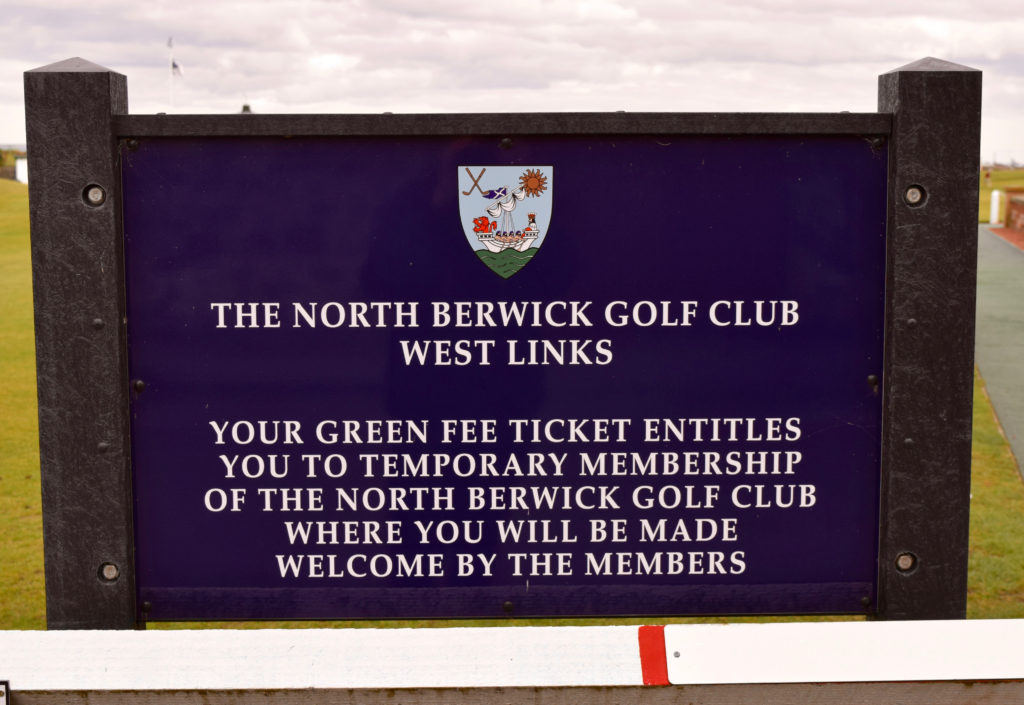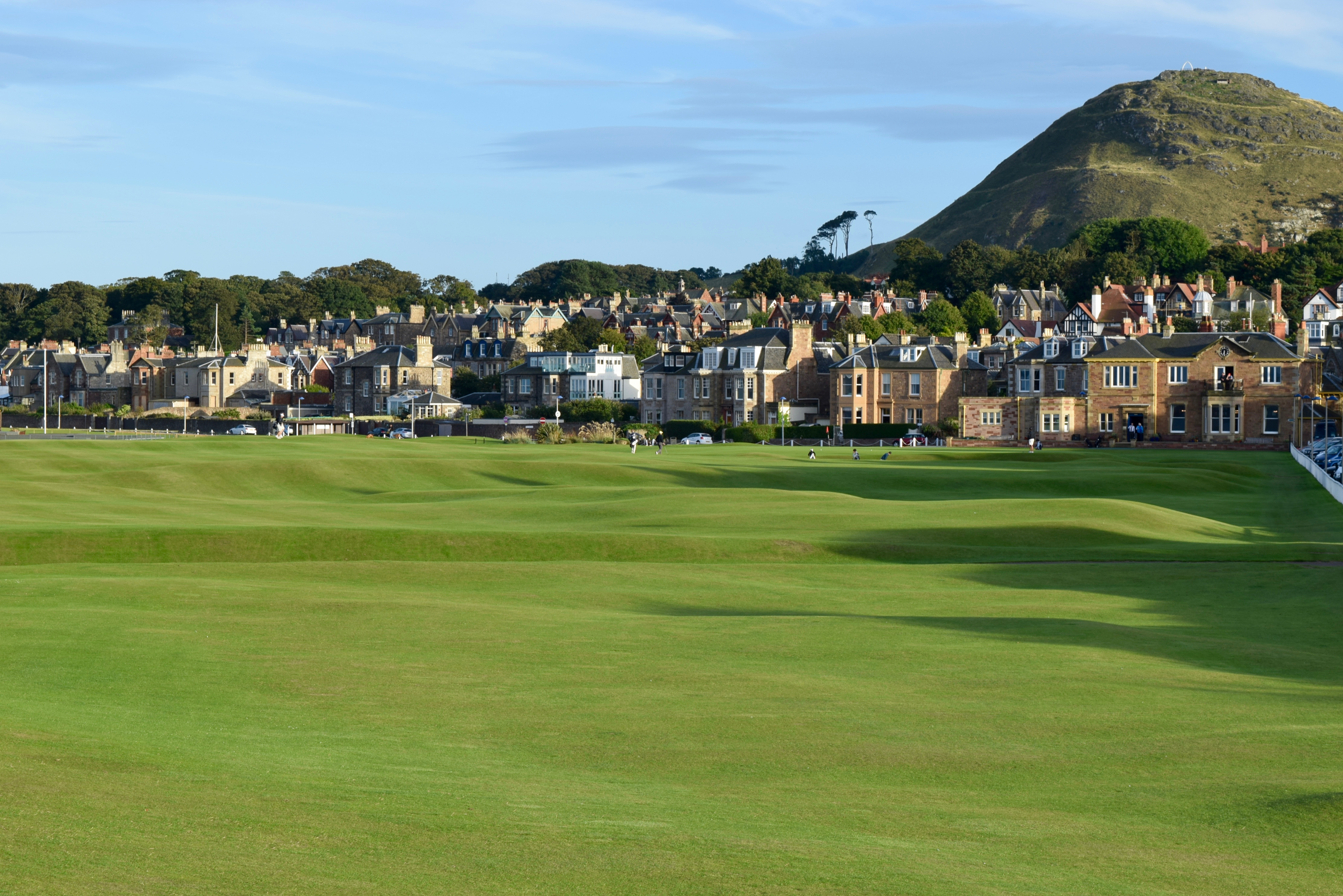Scotland, day ten: North Berwick GC, thanks for the memories
A grand (if bittersweet) finale as our trip ends at an historic, highly regarded course that delivers memorable holes, memorable beauty and memorable hospitality
NORTH BERWICK, EAST LOTHIAN, Scotland — Martyn Huish, the head PGA professional at North Berwick Golf Club (West Links), is 47 and was born here, in this town in East Lothian, less than an hour’s drive from Edinburgh, on the south shore of the Firth of Forth.
He’s been head professional for seven years, and served as an assistant for 18 years before that, working for his father, David, who was head professional for 42 years.
“I was born and brought up the town, and raised my family here as well,” Huish said Sunday. “I’ve had lots of opportunities to go elsewhere, but declined them all. … Why would you want to be anywhere else?”
Situated across the Firth of Forth from the historic county of Fife, itself famous for golf courses, including the Old Course, East Lothian is rich in golf courses, both in stature, with links such as Muirfield and Gullane, and number, with about 50.
North Berwick (pronounced Bear-ick) dates to 1832, when it consisted of three holes out to a stone wall, and three holes back. It is the third-oldest golf course in the world still playing over its original links; the only two older are the Old Course at St. Andrews, and Musselburgh.
“The thing about the course is that it hasn’t really been designed as such,” said Derek Ferguson, 60, a retired lawyer who greeted visitors to the club Sunday, showing them around the clubhouse that was built in 1880, pointing out the original wooden lockers of the members, in the room where a club member who became Prime Minister, Arthur Balfour, once held a cabinet meeting.
“It’s kind of evolved, I suppose is the way to put it. It’s quite unique in that way, I think.”
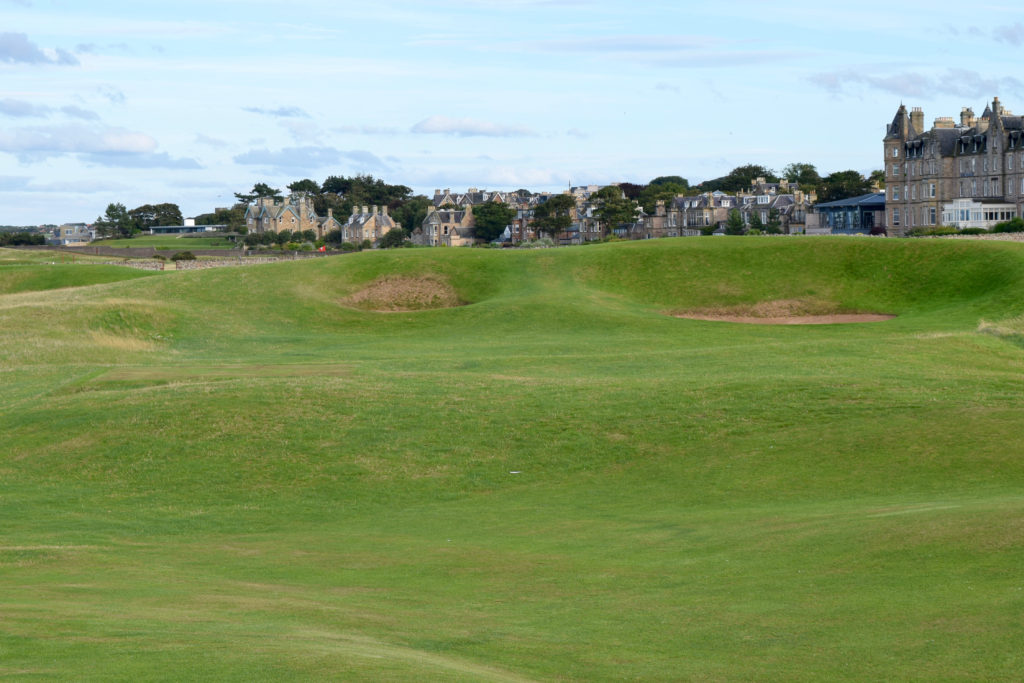
David Strath, who became greenkeeper in 1876, is credited for extending the course from nine to 18 holes, and with creating No. 15, a par 3 called Redan, a gift to golf course architecture, one of the most copied holes in the world. Wrote the late James W. Finegan:
“For well over 100 years, the best holes have been very little changed. Like Prestwick, West Links is, if you will, a museum of the game, taking us back to the latter half of the 19th century.
“The combination of authentic links golf, inarguably great holes and ravishing sea views — Bass Rock, the islets of Fidra, the Lamb and Craigleith, and the coast of Fife — makes the game here a joyous occasion every step of the way. …
“For pure golfing pleasure — a pleasure bred of diversity, challenge, unpredictability, proximity to the sea, and the satisfaction of true links shot-making — few courses can equal North Berwick’s West Links. Is it a candidate for the one course to play, day in and day out, for the rest of your life? Oh my, yes.”
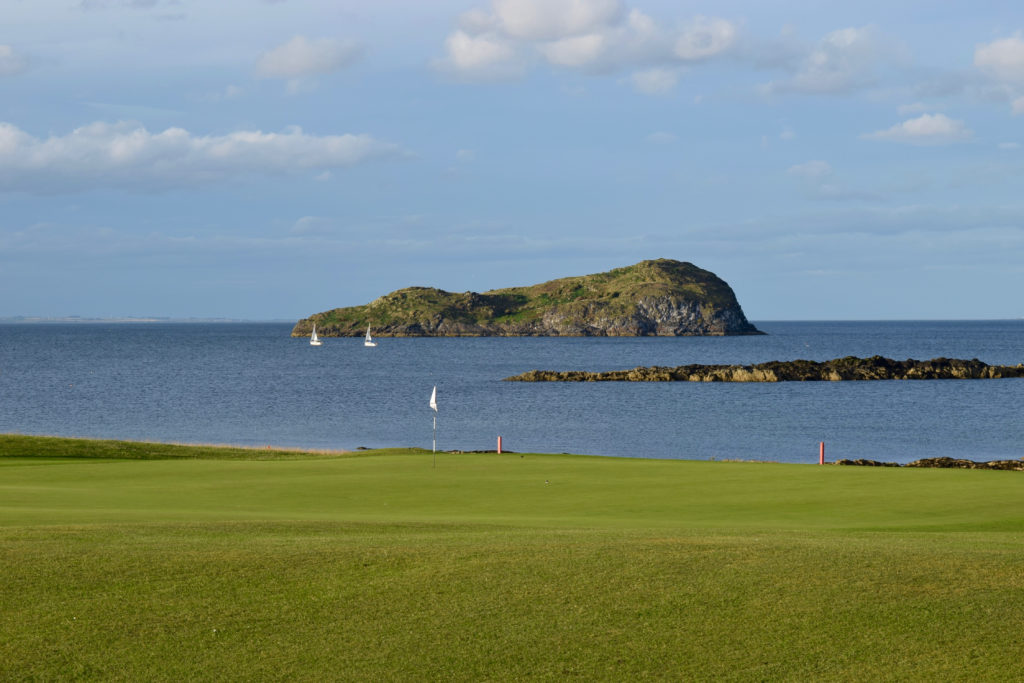
Huish started playing very young, with clubs made for him by his maternal grandfather, the head professional at nearby Gullane. He remembers playing his first round there, and then played the nine-hole children’s course at North Berwick until he was 12, when he was allowed to play the main course, West Links.
“It’s so much fun,” he said of the course. “It’s unique. Every time you play is completely different. You don’t get the same wind, you don’t get the same conditions, any two days. Everything is new every single time, you’ve got to re-assess the course every single time you play.
“You keep seeing things that are new and fresh each time.”
In his lifetime, Huish said, little has changed at North Berwick. “Not significantly,” he said. “We’ve put new tees in, to cope with modern technology. A couple of new bunkers. But apart from that. …
“The greens have all stayed in exactly the same place in my whole lifetime. We haven’t changed one of them, except that we raised the side of No. 1 green to make a larger green.”
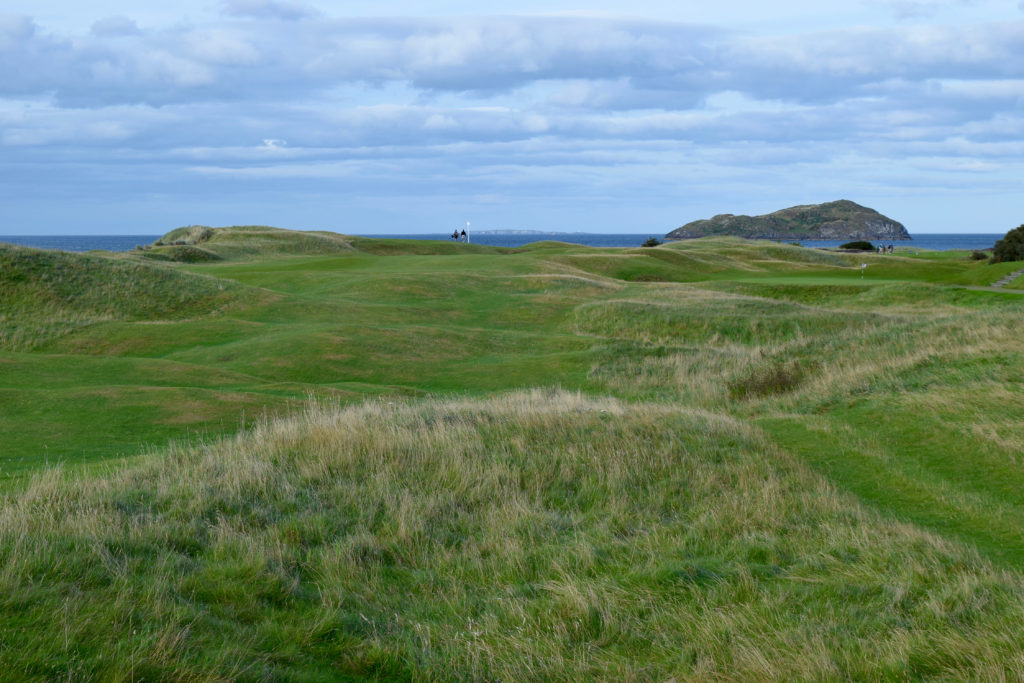
As Ferguson put it, the course “hasn’t really been tampered with.”
North Berwick hasn’t received the kind of exposure that comes with hosting major tournaments, and hasn’t needed that to become a destination for golfers. Ranked No. 60 in the world by Golf Digest, No. 63 by Golf Magazine, it attracted 11,000 visitors last year.
Visitor green fees are 105 pounds (about $130) for a weekday round, a tremendous value considering the golf course; Ferguson said that for a long time the club tried to keep the greens fee under 100 pounds, but raised them 10 percent to create more playing opportunities for members.
Such is the draw of North Berwick that the increase only reduced visitor play by 1 percent, he said.
Three holes at North Berwick are listed among the top 500 in golf — the par 4 No. 7 hole, with Eil Burn in front of the green, creating a second shot challenge; the par 5 No. 9 hole, and, most famously, No. 15, the Redan hole, the term used for a military defense, in this case a par 3 of 173 to 190 yards, depending on tee box, in which the golfer must clear a mound with two bunkers to a right-to-left sloping green that he can’t see — and neither can he see the huge bunker and the swale between the mound and the putting surface.
But those are far from the only memorable holes. There’s No. 13, in which an old stone wall separates the green from the fairway, and No. 14, a par 4 called “Perfection,” no doubt because that’s required; there’s No. 16, where the green complex consists of two islands, as it were, separated by a swale; there’s No. 10, where the tee box, after some inland holes, takes the golfer back to views of the Firth.
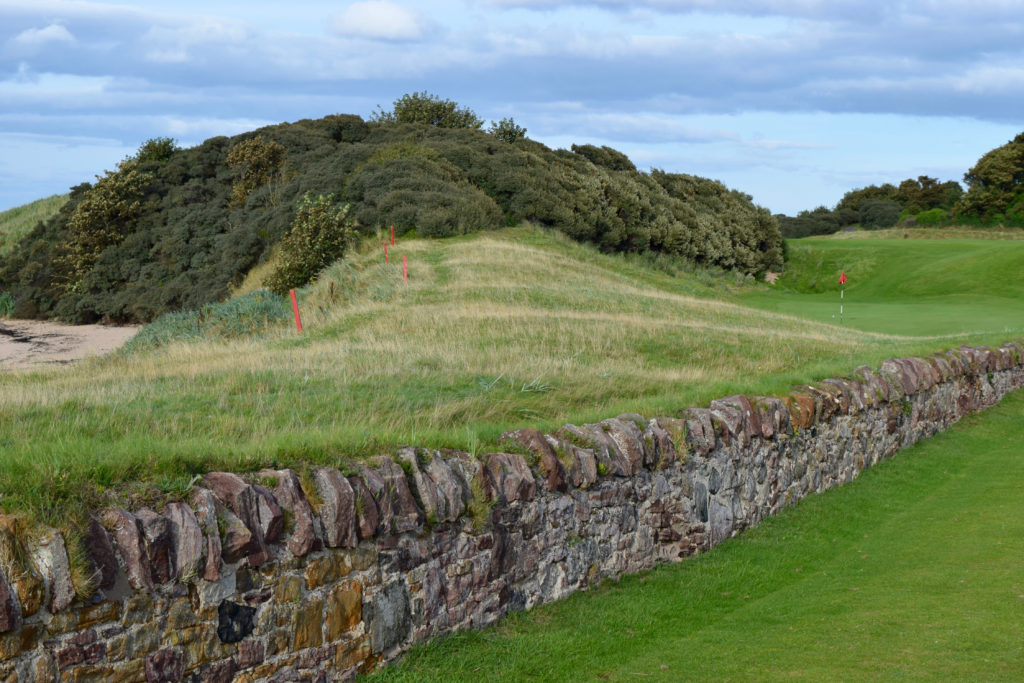
This isn’t an extremely long course, 6,150 from the blue tees on the visitors’ card, at a par of 71. “The fact is that it’s got character,” Ferguson said.
At the invitation and intercession of David Connor of VisitScotland, I played North Berwick on Sunday with three Northwest colleagues in golf journalism:
Former Register-Guard sports editor and columnist (and then of the Seattle Times) Blaine Newnham, one of the most respected golf writers in the Pacific Northwest, author of “America’s St. Andrews” about the construction of Chambers Bay; Tom Cade, director of communications for the Pacific Northwest Golf Association and editor of Pacific Northwest Golfer Magazine, and Rob Perry, the immensely gifted photographer (and golfer) who specializes in golf courses.
Certainly, it was a very good and fun day, the course is tremendous, in the discussion for everyone’s favorite golf course of the trip.
But it was bittersweet, too, because it was our last day, and because we had built to this final day with great expectation for Newnham, who has played so many great courses but never this one. Unfortunately, when morning came, so did an out-of-the-blue upper arm injury that prevented him from swinging a club.
And so there was no final match between former Register-Guard sports editors (Blaine had already clinched Scotland); Newnham walked the course with us, rolling putts on the greens, and seeing the reality of the wonderful course he’d dreamed about.
Cade shot 77, in windy conditions; Perry, who at one point had three straight birdies, left his round incomplete to shoot photographs in the late-afternoon light. My own round was erratic, not what I would have hoped, unofficially high 90s, and a couple of holes truly defeated me, though I only lost one ball, making my final total 15 lost over 10 rounds, against five found, a big improvement over last year at Ireland and North Wales, when I lost 40 in 12 rounds.
And I can also report that after miserable performances on some of Scotland’s most iconic golf holes — The Alps at Prestwick, The Railway at Royal Troon, among others — I found the green from 173 yards on the Redan hole and recorded a two-putt par!
The final hole of the trip, No. 18, is a short par 4, and Cade, from 269 yards and I, from 245, both hit our tee shots just short of the green. A longish putt on to the green, for each of us, and another putt into the hole, and we each left North Berwick with birdies.
A nice memory, but merely a footnote to this journey in which we saw special golf courses, met some wonderful people and shared great experiences as friends, so very grateful for the chance to be here. And with that we bid farewell to North Berwick, and to Scotland.
